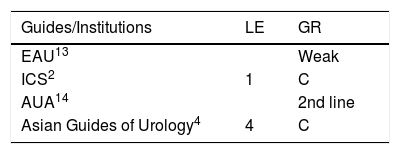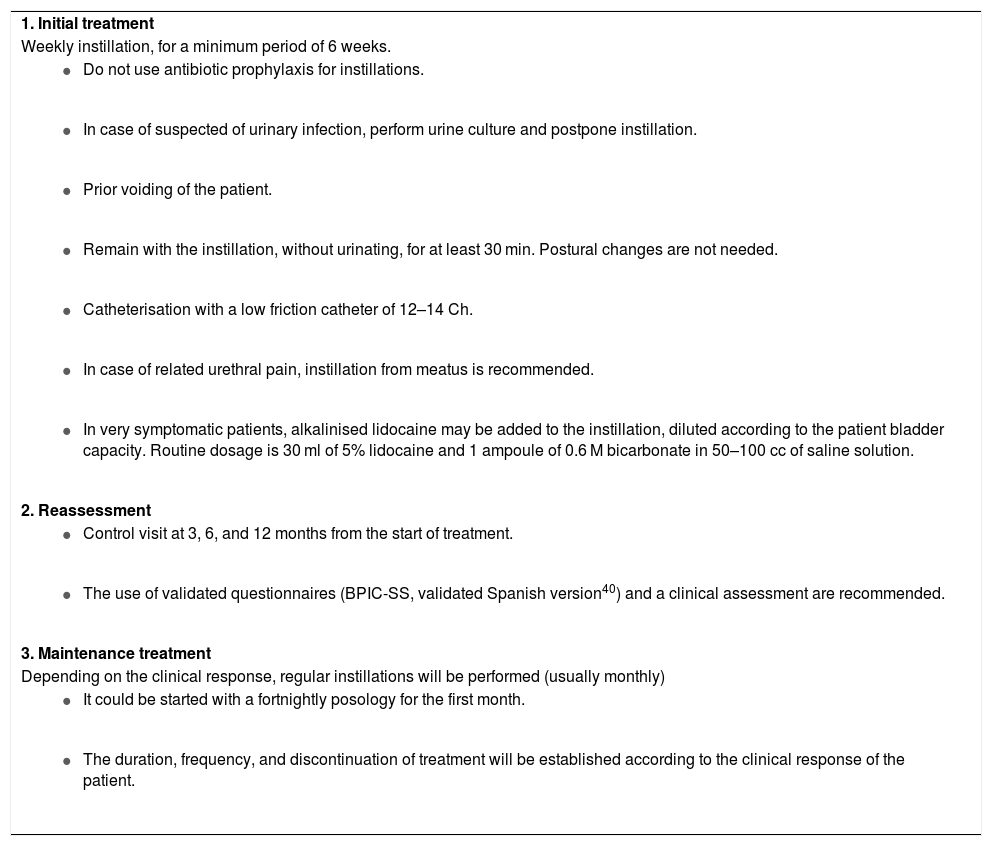Bladder pain syndrome (BPS) is a complex syndrome, without a clearly defined etiology that encompasses different entities, such as interstitial cystitis. This leads to difficulties in establishing a precise definition, obtaining accurate prevalence data, and defining diagnostic criteria and standardized assessment methods. Moreover, there is no consensus regarding the treatment of BPS. Intravesical instillations with hyaluronic acid (HA) are an option, although no specific recommendations have been made yet.
ObjectiveTo synthesize the scientific evidence on the therapeutic options available for BPS and to establish a work plan and recommendations for the use of intravesical instillations with HA.
The Spanish Association of Urology, through the Functional, Female, and Urodynamic Urology Group, created a commission of experts. This commission was in charge of reviewing literature (evidence), agreeing on the work plan, and proposing recommendations.
ResultsThere is great variability in literature on the treatment of BPS, without a standard regimen of intravesical instillation with HA (frequency and duration of initial and maintenance treatment).
ConclusionsIntravesical HA instillations (usual dose of 40 mg) are effective and safe. They can be combined with other options, with efficacy still to be determined in some cases. Treatment is divided into several initial weekly sessions, followed by maintenance treatment, usually monthly (unestablished duration of cycles).
Recommendations on the management of BPS were agreed, with diagnostic criteria and guidelines for treatment with intravesical HA (initiation, reassessment, and follow-up).
El síndrome del dolor vesical (SDV) es un síndrome complejo, sin etiología claramente establecida, que engloba diferentes entidades como la cistitis intersticial. Esto conlleva dificultades para establecer una definición precisa, obtener datos de prevalencia exactos y definir criterios diagnósticos y métodos estandarizados de estudio. Tampoco existe homogeneidad sobre el tratamiento del SDV. Las instilaciones endovesicales con ácido hialurónico (AH) son una opción, sin aún recomendaciones específicas.
ObjetivoSintetizar la evidencia científica sobre las opciones terapéuticas disponibles para el SDV y consensuar un plan de trabajo y unas recomendaciones para el uso de las instilaciones endovesicales con AH.
La Asociación Española de Urología, a través del Grupo de Urología Funcional, Femenina y Urodinámica, generó una comisión de expertos. Esta comisión fue la encarga de revisar la literatura (evidencia), consensuar el plan de trabajo y proponer recomendaciones.
ResultadosExiste una gran variabilidad en la literatura sobre el tratamiento del SDV, sin un régimen estándar de instilación endovesical con AH (frecuencia y duración del tratamiento de inicio y mantenimiento).
ConclusionesLas instilaciones endovesicales de AH (dosis habitual de 40 mg) son efectivas y seguras. Pueden combinarse con otras opciones, siendo aún necesario comprobar la eficacia en algunos casos. El tratamiento se divide en varias sesiones iniciales semanales, seguidas de tratamiento de mantenimiento, generalmente mensual (duración de los ciclos no establecida).
Se consensuaron recomendaciones sobre el manejo del SVD, con criterios diagnóstico y pautas para el tratamiento con AH endovesical (inicio, reevaluación y seguimiento).








